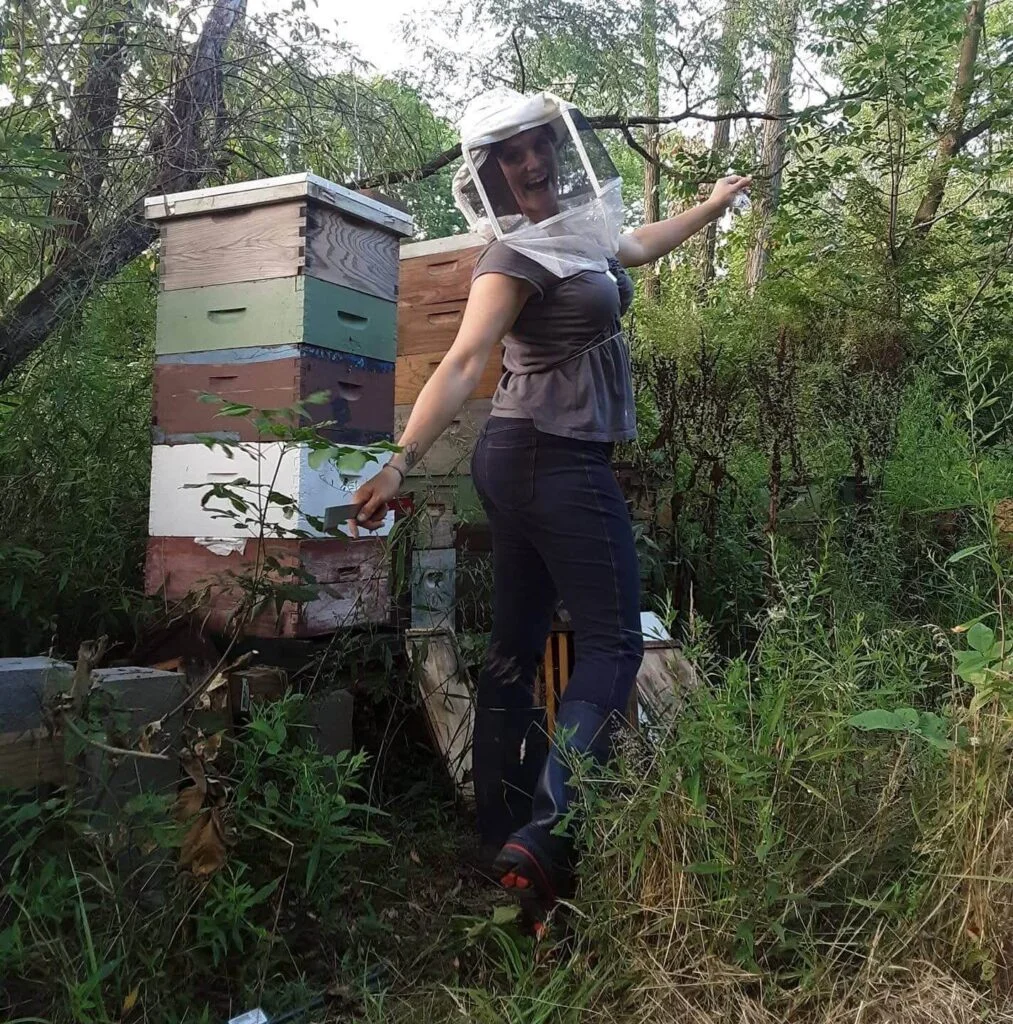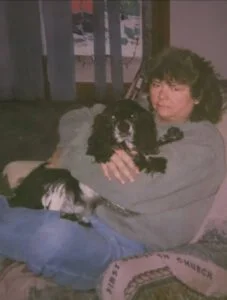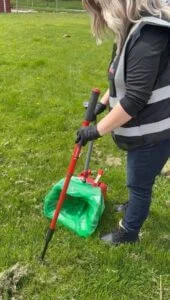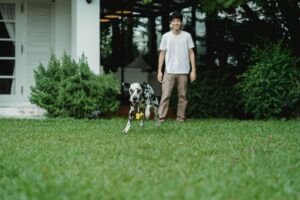
Save the Bees, Save the Planet: A Backyard Guide to Pollinator-Safe Pet Care
Featuring Expert Insight from Emily Mueller of Mueller Honey Bee
At The Scoop Ninjas™, we believe in protecting more than just your yard — we’re here to protect your pets and the planet. That’s why we’re honored to spotlight Emily Mueller, a dedicated Ohio beekeeper, pollinator advocate, and the heart behind Mueller Honey Bee, for a powerful Q&A on how everyday lawn care choices impact our ecosystem.
Emily’s decades of hands-on experience and massive online following have made her a trusted voice in bee education, conservation, and ethical beekeeping — and her insights couldn’t come at a more important time.
🐝 Why Bees Matter More Than You Think
The Scoop Ninjas™: Can you explain why pollinators like bees are so important to our ecosystem and food supply?
Emily Mueller: “One out of every three bites we consume at every meal are possible due to honey bees. Pollinators are the reason we get to eat every single day of our lives.”
Without bees and other pollinators like butterflies, moths, and even bats, most of our crops simply wouldn’t survive. These creatures are foundational to life as we know it.
🚨 The Reality of Pollinator Decline
The Scoop Ninjas™: How have you personally seen the decline in pollinators affect your work as a beekeeper?
Emily Mueller: “Around my fourth year as a beekeeper, we had a large honey bee loss due to varroa (a parasite on bees), in addition to a very long winter and spring. I had less than ten bee swarm calls that year compared to the 100 or so I receive regularly.
It also seems there are fewer and fewer butterflies, lightning bugs, and moths these days as our desire to preventatively spray for insects increases.”
☣️ Why Traditional Lawn Treatments Are Dangerous
The Scoop Ninjas™: Why are traditional flea and tick treatments harmful to pollinators — even when used on private lawns?
Emily Mueller: “Mosquito, tick, and flea lawn treatments are made out of insecticides, even when referred to as ‘natural’ or ‘organic.’ These chemicals disrupt the nervous system of ALL insects, paralyzing and killing them. They don’t just kill the pests they target — they eliminate all our beneficial insects: honey bees, butterflies, grasshoppers, dragonflies, lightning bugs, and even bats.
With the food chain, you’ll then have birds and other predators consuming these contaminated bugs. They are also harmed and poisoned by this consumption. When you spray for one insect, you’re actually killing thousands. It settles in the ground and kills the larvae where many insects grow. It lands on petals and kills butterfly eggs. It’s an awful cycle that ruins our natural habitat.”
🌱 Safer, Smarter Alternatives to Protect Pets and Pollinators
The Scoop Ninjas™: We’ve been researching pollinator-safe flea and tick yard treatments. Some options we’ve come across include:
- Cedarwood oil
- Diatomaceous Earth (Food Grade)
- Neem Oil (diluted)
- Plant-based sprays (e.g., lemongrass, peppermint, rosemary, geraniol)
We’d love your take on Neem Oil, in particular, since it’s so widely used. What are your thoughts on using Neem Oil in gardens and yards — especially when trying to protect pollinators?
Emily Mueller: “We personally use neem and beneficial nematodes for our fruit trees and bushes. It is important when using any type of pest management that you’re not getting it into the flower of the plant directly. Honey bees will not try to collect food from grass or leaves — they take the nectar and pollen from the flower. So keeping any chemical, organic or not, out of their food source will prevent contamination.
If you must spray, do it late in the evening when these important pollinators aren’t active. However, there are natural ways to prevent these pests and I highly recommend helping preserve nature for the next generation by using safer options. All these things we use live in our soil, which drains into our water sources. We need to be aware of how much we’re poisoning ourselves.”
The Scoop Ninjas™: Absolutely, and I think you just touched on our next question, are there specific methods of application we should follow to ensure we aren’t harming pollinators (e.g., time of day, avoiding flowers, etc.)?
Emily Mueller: “The key is always avoiding the flowers and spraying when bees are not active — typically in the evening. The more we can protect pollinators, the more we ensure a thriving, balanced ecosystem.”
🐾 What This Means for Pet Parents
At The Scoop Ninjas™, many of our clients ask how to keep their dogs safe from pests without harming the planet. Emily’s insights make one thing clear: the chemicals we use in our yards don’t just disappear. They impact pollinators, pets, wildlife, and water sources.
That’s why we’re committed to using eco-safe sanitizers, biodegradable and compostable bags, and promoting awareness about pollinator-friendly lawn care
🌼 Want to Bee the Change?
Creating a pollinator-friendly yard doesn’t require a total landscape overhaul — just a few intentional changes can make a world of difference. Here’s how you can start:
- Plant native wildflowers and flowering herbs like bee balm, coneflower, lavender, and mint to provide nectar and pollen throughout the growing season.
- Avoid chemical pesticides and herbicides. Even “natural” sprays can harm beneficial insects. Instead, opt for pollinator-safe treatments like neem oil or beneficial nematodes — and always spray in the evening when bees aren’t active.
- Leave some areas a little wild. A patch of tall grass or a brush pile can offer essential shelter for pollinators like butterflies, solitary bees, and fireflies.
- Provide a water source. A shallow dish filled with pebbles and water gives thirsty pollinators a safe place to land and drink.
- Use compost instead of synthetic fertilizers. Healthy soil supports healthier plants — and pollinators.
At The Scoop Ninjas™, we’re proud to support pollinator health by keeping your yard clean without introducing harmful chemicals into the ecosystem. Our team uses:
- Biodegradable and compostable pet waste bags
- Eco-safe, non-toxic sanitizers and deodorizers
- Pollinator-conscious practices that respect your entire outdoor ecosystem
By removing pet waste promptly and safely, we help reduce parasite spread and lawn damage while supporting a yard that’s safer for pets and pollinators alike.
🌿 Every yard matters. Partner with us to keep yours buzzing with life — and free of poop — all while protecting the environment we share.
👉 Follow Mueller Honey Bee on FaceBook or their website to learn more about backyard beekeeping, pollinator rescue, and pesticide-free practices.
And if you’re looking for the most responsible, eco-conscious pet waste removal team in Northeast Ohio, get your free quote from The Scoop Ninjas™ today.
Let’s keep the earth buzzing — one clean, chemical-free yard at a time. 🐝💚





